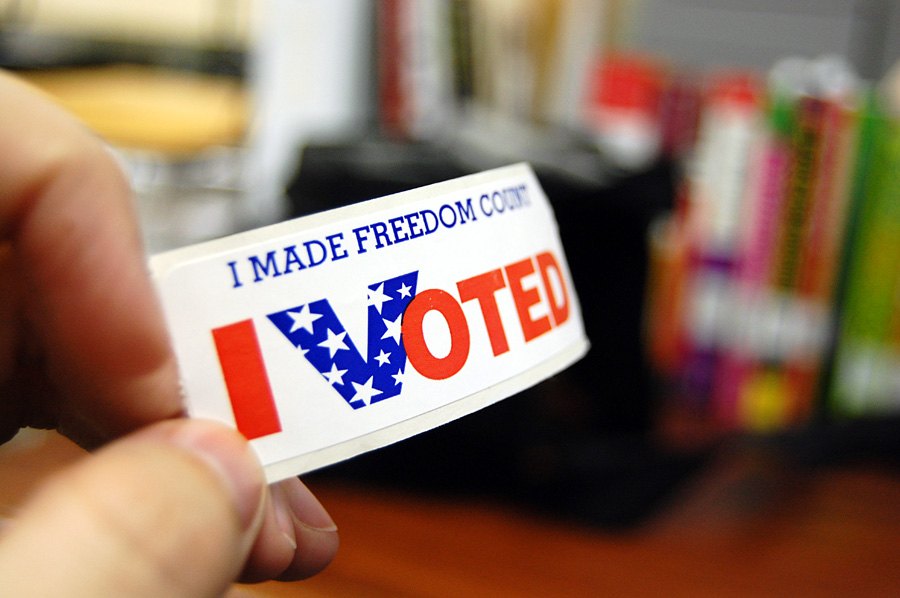A team of researchers from Wesleyan and Yale recently released a report outlining the voting rights of people diagnosed with serious mental illnesses (SMIs) in the US. Although the right to vote is considered fundamental to democracy, people diagnosed with SMIs often run into barriers to voting, causing them to be less likely to vote.
The report outlines the importance of individuals diagnosed with SMIs voting, the common obstacles preventing them from voting, and points to pertinent state and federal laws relevant to this issue. The authors suggest how voter competence laws, photo IDs, voter challenges, and incarceration can affect the voting behavior of people diagnosed with SMIs and make clinical recommendations for improving voting opportunities.
“Barriers to voting, as well as efforts to address them, are experienced by persons with SMIs not only in the United States but also worldwide,” write the authors, led by Sarah Kamens at Wesleyan University.
“Means to combat these barriers in the United States include educating mental health service users and providers about the universal right to vote, federal and state laws relevant to persons with SMIs, and what to do in the cases of violation of voter rights.”

People diagnosed with SMIs are entitled to the same voting rights as any other citizen and are impacted by the outcome of elections. Moreover, their voting has both personal benefits, such as promoting social and communal belonging, as well as societal benefits, including the maintenance of a fundamental pillar of democracy by accurately representing the diversity of its constituents. However, those diagnosed with SMIs are less likely to vote, and often lack access to information about voting rights/registration and political candidates, adequate transportation to polls, voter IDs and face voter competence laws.
When they do vote, people diagnosed with SMIs do so in a similar fashion to the general population, with a slight preference for liberal candidates, perhaps reflecting support for platforms highlighting public health improvements, equality, and socioeconomic prosperity for disadvantaged communities.
Several federal laws, ranging from the Equal Protection Clause of the Fourteenth Amendment to the National Voter Registration Act, protect the right to vote for people with disabilities. These laws offer a host of protections, including the right to assistance with voting, registration, transit to polling locations, and submission of absentee ballots.
The National Voter Registration Act, for instance, aims to make it easier for citizens to register to vote and requires all state offices that provide state-funded programs engaged in disability services to offer voter registration.
The Hatch Act, meanwhile, is often misinterpreted. While it does prevent federal employees or agencies from engaging political activities, it does not prevent mental health professionals from discussing voting rights with patients or providing neutral assistance in voting.
State laws also significantly impact voting rights for people diagnosed with SMIs. Voter competence requirements, for instance, often impose legal restrictions on the right to vote. Just ten states have no legal restrictions on voting for people with disabilities. In most of the remaining states, only a court can determine competence, per the Doe Standard, where a judge decides whether an individual possesses an understanding of the nature and effect of voting.
“In 22 states and the District of Columbia, voting is disallowed only when a court determines that an individual lacks the capacity to vote,” write the authors. “Four states ban voting by individuals deemed ‘non-compos mentis,’ and seven use anachronistic and stigmatizing terminology such as ‘idiots,’ ‘unsound mind,’ and ‘insane persons’ to restrict voting.”
Some states require a photo ID to vote, which disproportionately impacts those diagnosed with SMIs who may lack financial resources to have or obtain an ID. States are required to make modifications so that voter ID laws don’t discriminate against people with disabilities, though other laws, such as requirements to submit preliminary ballots, make for different voting conditions for individuals diagnosed with SMIs.
Voter challenge laws, created to protect against voter fraud, allow private citizens to challenge voter eligibility, and have incited controversy surrounding the targeting of marginalized voters. Incarceration also affects people diagnosed with SMIs who are over-represented in jails and prisons. Some states restrict voting rights of people convicted of felonies, even after a sentence reversal, and even those who are detained and retain the right to vote face difficulty receiving information about voting, an absentee ballot, or poll access.
There has been advocacy to strengthen the right to vote for those diagnosed with SMIs, including educating mental health service clients and providers about voting rights and providing information about federal and state laws and what to do when voting rights are restored to people diagnosed with SMIs.
“Mental health providers should be educated in the stipulations of the National Voter Registration Act and Hatch Act as previously highlighted,” write the authors.
“Staff at inpatient hospitals and community clinics should ensure that voter registration and other informational materials are available well prior to the relevant deadline. Also, voters in states with voter ID laws may need assistance in applying for and obtaining an ID. Qualified mental health professionals can also provide assessments of voting capacity… [and] finally, in states with voter competence requirements, voting rights can be restored under state law; moreover, state voter requirements can be challenged at the federal level.”
****
Kamens, S. R., Blum, E., & Styron, T. H., (2019). Voting rights for persons with serious mental illnesses in the U.S., Psychiatric Rehabilitation Journal, 42(2), 197-200. (Link)















Thank you for this article. I was incarcerated at the Winnebago Mental Health Institute in Oshkosh Wisconsin during the 2008 presidential elections.
The hospital had a long standing policy of allowing patients to stay up late so they would not miss the end of a Green Bay Packers Game. I suspected it was easier for Staff. Packers fans are notorious and I can only imagine that making an adult go to bed during the last quarter of a Packers Game was unmanageable. There are not enough Staff to dope and restrain everyone because it takes 20 of them to come at you. If every Packers Fan simultaneously decided to boycott bedtime on every unit I bet that no Staff would watch the end of a game ever.
I was watching the first presidential debate when I was told it was time for bed. Immediately I voiced my opinion on the Fact that if it were the Green Bay Packers I would be allowed to continue watching it and perhaps Politics being the Sport that actually effects our future should also be allowed as a reasonable accommodation to the bedtime rule like football.
*Football rule: If you have been watching the game from the beginning you can stay up until it ends.
The Staff agreed with me and I went to bed.
I contacted the patient advocate Larry and he got everything approved.
In Wisconsin you do not need to be registered to vote.
I watched all debates in their entirety(usually alone) and Everyone voted in the Presidential Election by absentee ballots.
We were forensic patients who were committed due to a finding of NGI. Guilty but Not guilty of a Felony due to Mental Disease or Defect.
We never lost our right to vote.
I was even allowed to stay up late to see who won the Election.
Report comment
“voting rights of people diagnosed with serious mental illnesses (SMIs)” ?
It should be “voting rights of people labeled as having serious mental illnesses (SMIs)”
Report comment
We should be educating people so that they never passively comply with being labeled as having ~mental illness~, or ~autism aspergers ADHD~ either.
Report comment